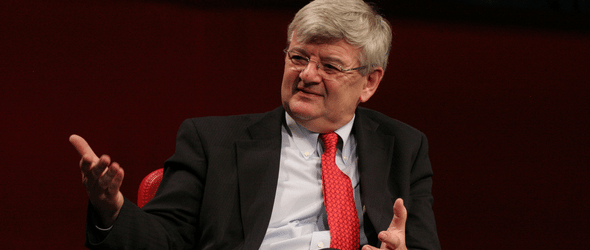Economic realism will ease anti-Turkish feeling, Joschka Fischer says

EUOBSERVER / BRUSSELS – Austrian, French and German opposition to Turkey joining the European Union will melt away with time, Germany’s ex-foreign minister Joschka Fischer has predicted.
Speaking to EUobserver on the margins of an event to launch a Council of Europe ‘Group of Eminent Persons’ in Brussels on Thursday (30 September), he said a growing realisation that Europe needs to replenish its aging workforce is already altering perceptions and that it is Turkey, not the EU, which might ultimately jettison accession plans.
“We may knock on the doors of Ankara and there may be nobody home,” Mr Fischer warned.
“If you look at France and Germany, you don’t need to be a prophet to see things will change,” he added. “Europe’s future economy will depend on its openness. We need immigration, that’s the maths of it. Either we Europeans wake up or we become poorer.”
The former Green party politician is a highly-paid advisor for the Nabucco consortium trying to build a gas pipeline in Turkey. The Council of Europe group, which he is to chair, will study the problem of growing intolerance in Europe as witnessed in the recent Roma dispute and the rise of far-right parties even in traditionally liberal countries such as Sweden.
Turkey, home to Europe’s largest Muslim and Roma populations, would wield enormous clout in the EU if it joined.
But at the same time its median age is just 28 compared to 42 in the Union and its economy grew by around 11 percent in the first half of this year compared to the EU’s 1-2 percent.
Its confidence on the world stage has grown in recent years as has that of fellow emerging power Brazil. The two countries in May put forward an alternative plan for tackling Iran’s nuclear ambitions, challenging the authority of the so-called P5+1 group of France, Germany, the UK, China, Russia and the US which had monopolised international diplomacy on Iran until then.
German foreign minister Guido Westerwelle, from the Free Democratic Party in the German coalition government, has in recent days spoken along the same lines as Mr Fischer.
“It is in our own interest that the perspective of Turkey remains European and Western,” he said at a press briefing in Washington on Wednesday. “It sometimes amazes me how self-assuredly countries that are influential today assume that things will always be that way,” he told the Wall Street Journal a week earlier.
The UK and Sweden are the biggest supporters of Turkish accession. But German Chancellor Angela Merkel’s centre-right Christian Democratic Union party, Austria and France continue to say it should be a “privileged partner” instead of an EU member. Meanwhile, Cyprus has vetoed the opening of eight chapters and the closing of any chapters in the past five years of accession talks due to a territorial dispute.
Turkey feels insulted, optimistic
Ankara hopes that another chapter (on competition) will be opened by the end of the year and that three more (on public procurement, education and energy) will follow in 2011. But its diplomats are not shy about voicing frustration with the slow pace of progress.
“It is insulting to be offered something [a privileged partnership] that does not exist,” Egemen Bagis, the Turkish junior minister for EU affairs and its chief negotiator on EU accession, told reporters at a lunch in Brussels on Wednesday.
“I am confident in the democratisation and economic prosperity of my country. To be honest, I don’t have so much confidence in your economic prosperity. We are not coming with additional burdens to the EU, we are coming yo take burdens from Europe. My new motto is: ‘Hold on tight Europe, Turkey is coming to save you.’”
Mr Bagis sees an ally in the EU’s UK-origin foreign relations chief, Catherine Ashton, and its Czech-origin enlargement commissioner Stefan Fuele.
Recalling a recent six-hour-long meeting with the pair in Istanbul, the junior minister said: “She is a very smart, intellectually well-prepared, wise lady, who is aware of issues in detail … I can talk with them and they can talk with us.”
EUOBSERVER
